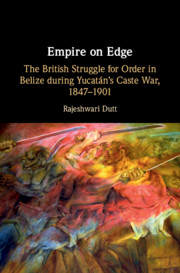Book contents
- Empire on Edge
- Empire on Edge
- Copyright page
- Dedication
- Epigraph
- Contents
- Figures
- Maps
- Tables
- Acknowledgments
- Abbreviations
- Introduction
- 1 Business as Usual: Mayas and Merchants on the Yucatán-Belize Border at the Onset of the Caste War
- 2 Ungoverned Passions: Mayas and Hispanic Refugees in Belize, 1853–1861
- 3 Costs of Protection: Securing Belizean Borders during Maximilian’s Empire in Mexico, 1864–1867
- 4 Uneasy Alliances: British Officials and the Santa Cruz Maya during the Maximilian Years, 1863–1867
- 5 The Enemy Within: Hispanics and the Threat of Maya Raids, 1867–1880
- 6 Loyal Subjects: Hispanics in the Vision of a Belizean Colonial Nation, 1882–1898
- Conclusion
- References
- Index
6 - Loyal Subjects: Hispanics in the Vision of a Belizean Colonial Nation, 1882–1898
Published online by Cambridge University Press: 05 March 2020
- Empire on Edge
- Empire on Edge
- Copyright page
- Dedication
- Epigraph
- Contents
- Figures
- Maps
- Tables
- Acknowledgments
- Abbreviations
- Introduction
- 1 Business as Usual: Mayas and Merchants on the Yucatán-Belize Border at the Onset of the Caste War
- 2 Ungoverned Passions: Mayas and Hispanic Refugees in Belize, 1853–1861
- 3 Costs of Protection: Securing Belizean Borders during Maximilian’s Empire in Mexico, 1864–1867
- 4 Uneasy Alliances: British Officials and the Santa Cruz Maya during the Maximilian Years, 1863–1867
- 5 The Enemy Within: Hispanics and the Threat of Maya Raids, 1867–1880
- 6 Loyal Subjects: Hispanics in the Vision of a Belizean Colonial Nation, 1882–1898
- Conclusion
- References
- Index
Summary
By juxtaposing the trial of a Yucatecan Hispanic landowner, Manuel Jesus Castillo, with the proceedings of a Public Meeting leading to centenary celebrations of the Battle of St. George’s Caye, this chapter illuminates the centrality of the language and theme of loyalty in official attempts to exert control over the multiethnic, stratified – often discordant – colonial society that emerged in Belize in the aftermath of the Caste War. The power of the language of loyalty lay in its ability to simplify and reduce the complexity of Belizean multiethnic society to a binary (loyal vs. disloyal) that determined the “Britishness” of the colony’s subjects and consequently their place in the official vision of a colonial nation. The power and dominance of colonial officials and Crown representatives in Belize were not absolute but rather contested at various points in the nineteenth century. By the end of the 1890s, the language of loyalty provided beleaguered colonial officials with the vehicle for attempting to restore the power and privilege that they had progressively lost to the unofficial members of the colonial government.
Keywords
- Type
- Chapter
- Information
- Empire on EdgeThe British Struggle for Order in Belize during Yucatan's Caste War, 1847–1901, pp. 137 - 160Publisher: Cambridge University PressPrint publication year: 2020

